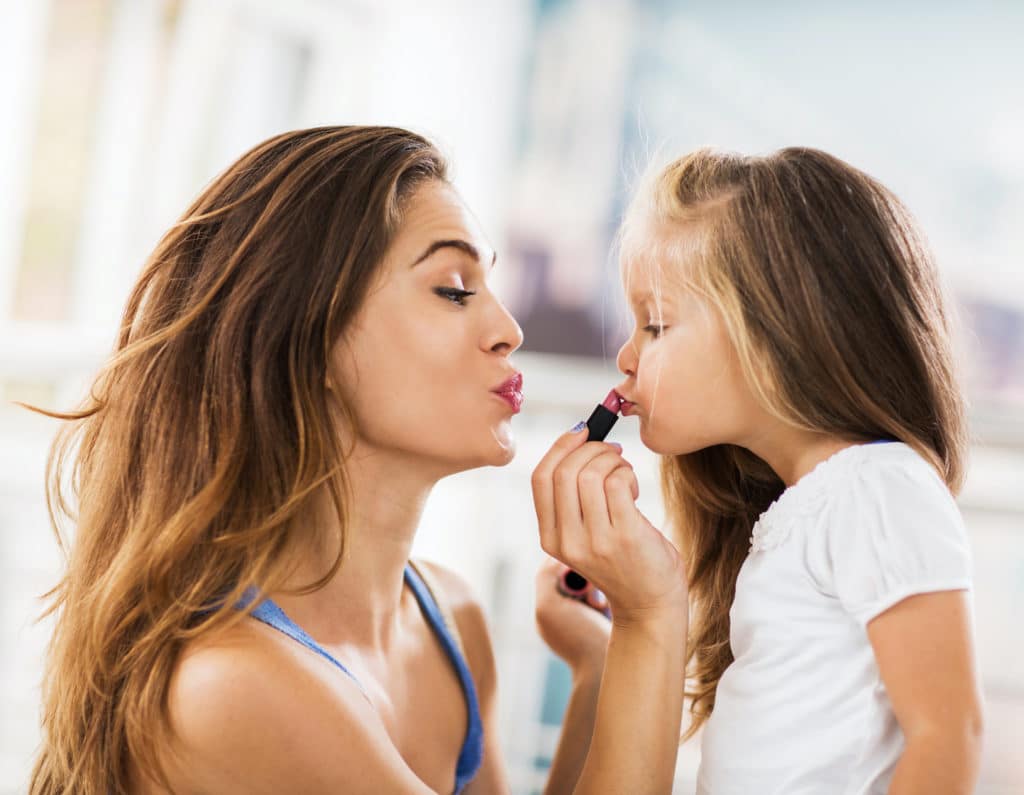
 Post Category - ParentingParenting
Post Category - ParentingParentingHow do you feel about kids wearing makeup? For stage performances, just playing around at home, or anywhere else — should makeup for kids be a thing?
At Sassy Mama we are lucky to get the chance to try out all sorts of kid-friendly products, services, performances and activities – how else could we tell you about all the awesome things to do with kids in Singapore unless we’re out there experiencing it for ourselves? (And by the way, check out our Tried & Tested column for our faves!) Recently one of our colleagues attended a launch for a new line of makeup for kids featuring clean, gentle ingredients. To our surprise, a somewhat heated WhatsApp discussion broke out amongst our team with a range of strong opinions about the ethics of kids wearing makeup.
When it comes to letting kids makeup, there seem to be two separate issues at play:
- Ensuring products contain ingredients that are safe and not overly harsh: This is a concerning issue for all makeup, but given how sensitive children’s skin can be, it’s a non-negotiable. If kids are going to inevitably want to play with makeup at home to mimic mama, or their ballet instructor insists that they wear makeup for the big dance recital, do your research and be sure to use safe products. This article has good background from a local dermatologist on the skin issues kids are extra susceptible to; this one highlights the terrifying outcomes that can result when a child wears makeup with dubious ingredients.
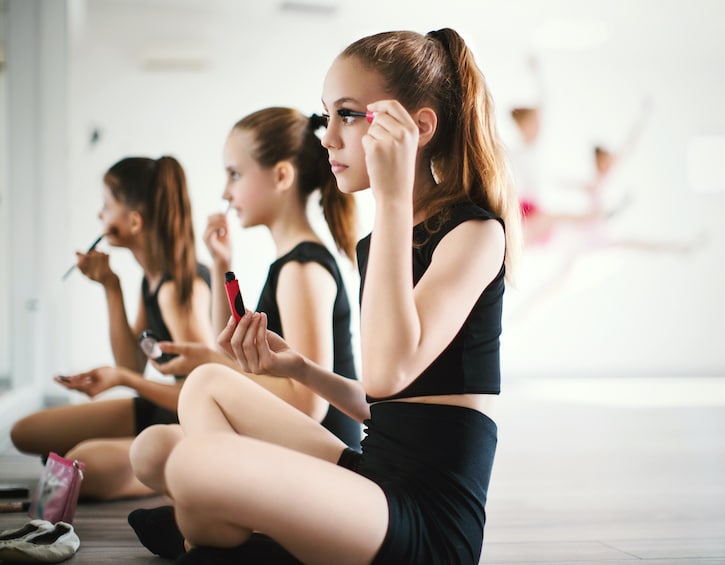
- The psychology behind makeup: Are we teaching kids that their self-worth is linked to their appearance? Does makeup sexualize children inappropriately? What lessons does it teach about gender and consumerism?
Read on for our team’s collected thoughts in favor of, and against, kids wearing makeup. For some, letting kids wear makeup (either at home or out in public) is about having fun, artistic expression, and exploring their own identities. For others, it represents just another tentacle of the dreaded patriarchy (like we said, the team has a wide range of opinions on this issue!).
Read more: Why You Shouldn’t Compliment Kids on Their Appearance (and what to say instead)
As the pediatrician quoted in this article points out, there is no magic age for when it’s suddenly ok to wear makeup, but ensuring safe ingredients and hygienic practices (eg washing their face, swapping out brushes and products every six months) is paramount. It’s also a good idea to remind your kids that makeup is generally meant to enhance rather than change or overpower their appearance. There are so many ways to make your kiddo feel good about themself, makeup need not be the only one!
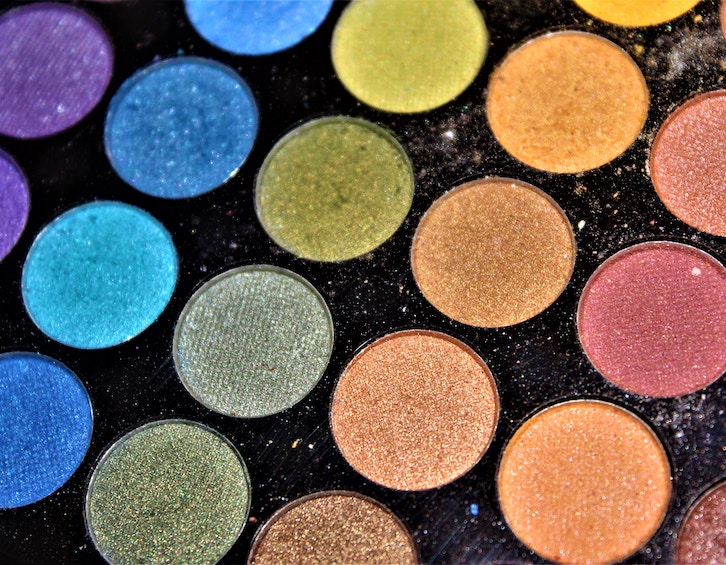
Nadia: Makeup is fun, and it’s just a tool
I hear my mommy peers often saying how careful they are not to allow their kids to use makeup, even kid-friendly brands. And I seem to be one of the few who really sees no harm in makeup for kids. My 8-year-old daughter has always had fun with it (she’s over it now, except for face painting every once in awhile). I mean if we overthink it yes, sure, we can come up with scary stuff like self-esteem issues etc but our kids see us apply makeup everyday anyway. How I see it is that sometimes they just want to mimic Mommy. In my perspective it’s more important to guide/educate than avoid. Makeup is just a tool. If your child has low self esteem issues, it will manifest in so many other ways before she relies on makeup, and makeup isn’t going to tip her over anyway.
We forget that makeup is also just fun to play with and giggle about. What’s important is the messages we tell our kids. And even if they don’t hear them and feel bad about their appearances, makeup is not the “evil” that will make this already existing situation worse.
I’m no psychologist but I feel today we are way too quick to label everything as “evil” or “bad,” but what’s really the root of the issue goes so much deeper than the “tool” that is labelled so. So many things are really harmless until we approach it from a “fear based” angle of: “This is bad for our kids because it will lead them to a path of low self esteem”.
For example. I’m in the camp of people who see no harm telling my girl how pretty she is or my boy too. And I do it. But I also tell both of them how kind they are. Or how brave.
Today so many of us see saying “How pretty!” to a girl as one of these societal “evils”.
I could go on. I think the point is that we all have different viewpoints but are all still awesome loving moms!
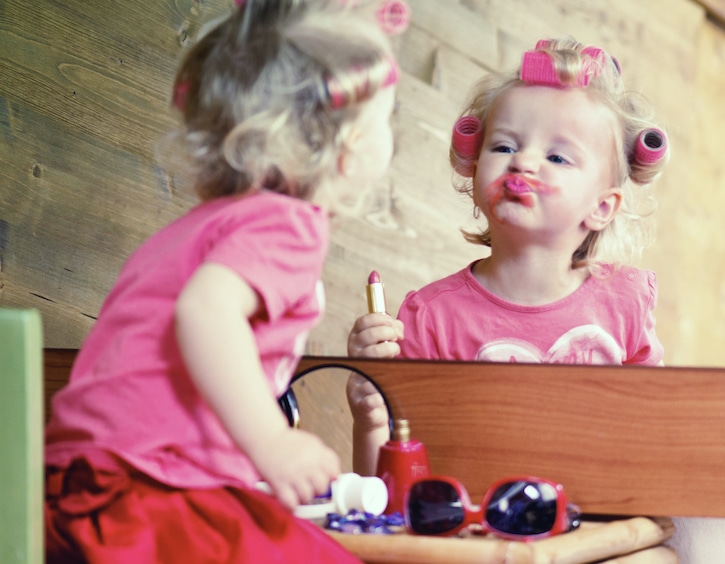
Carlijn: I don’t overthink it, I want my daughter to have fun
As a mother you act and say what feels natural and comfortable for you. My daughter is fascinated when I scrunch my hair after a shower (because I don’t blow dry); put on makeup (she likes to tickle her cheeks with the brush); and when I put on jewellery or a dress for that matter! She has been asking for “liptick” to which I’ll usually reply with a dab of Paw Paw cream on her lips.
I recently gave her a lipstick someone had sent to our office because the case itself looked super sweet and glittery; she is allowed to use it when she plays dress up or if we have a really special occasion like a wedding! Like Nadia, I don’t overthink it – I just want her to have fun with it because that’s how I grew up thinking about makeup!
Jessica: I hate the way makeup is marketed to little girls
Although I rarely wear makeup myself, I do admire the skill and creativity involved, and I believe makeup* has a place for both women and men.
I am not, however, a fan of makeup for kids, and I particularly hate the way it is marketed at little girls. From a very young age girls are taught that their appearance is a kind of currency, and marketing beauty products at little girls feels especially obnoxious. It normalises makeup application as part of a woman’s daily life, and teaches girls to seek approval on their appearance.
I don’t think that allowing your children to play with makeup will lead to low self-esteem; it’s not as simple as that. But I think it plays a part in the wider messaging that all children receive – that a girl’s appearance is intrinsically linked to her value. (Example: I just googled ‘makeup for girls’ and one of the top results was – ‘Do boys prefer girls with or without makeup?)…
*The lack of regulations around makeup ingredients is pretty horrifying. Read more here about some of the ingredients commonly used in lipsticks, perfumes and other beauty products. Check both your own and any children’s makeup you purchase so that you know what you’re putting on your face – and your child’s face. And finally, make sure the brands you use don’t test on animals!
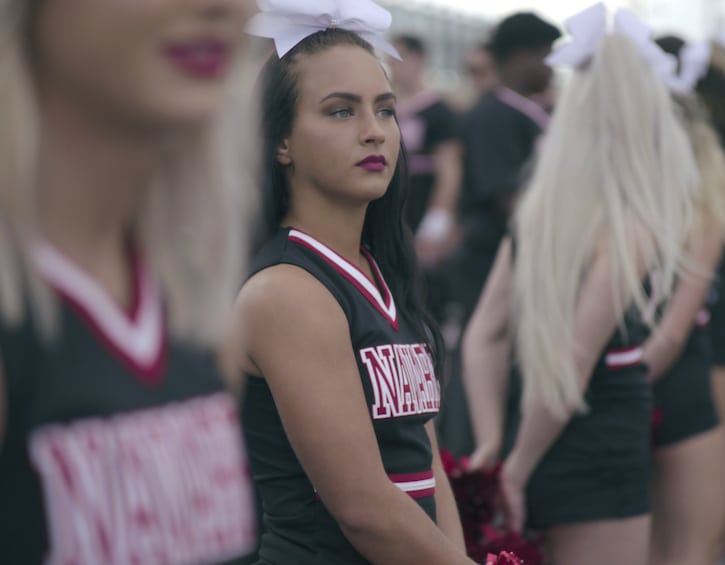
Kate: Skip the lipstick, smash the patriarchy
As our team was having these discussions and I was trying to articulate my feelings on the issue of kids and makeup (and really makeup in general), I came across this article recapping a survey of 3,000 women in Singapore, who said on average they purchase 20 eyebrow products per year, along with 18 foundations, 12 concealers and 12 eyeshadows. 20 eyebrow products per year! At what cost?!
The first thing I thought when I read this was, What is the male equivalent? This is the same question I’ve asked my colleagues when we’ve talked about the merits of vajuvenation, or botox. As another example, like everyone else on the Internet I recently binged the Netflix show Cheer about elite cheerleading athletes at a college in Texas. A truly jarring scene, for me, was when one of the women casually mentioned having to spend 2-3 hours on hair and makeup prior to a competition. Show me a male athlete who does the same!
Read more: Teaching Consent: Parenting Advice for Modelling Body Positivity
The same goes for the issue of makeup for kids; sure, little girls (and some little boys) might like mimicking their moms by putting on lipstick or painting their eyes with brightly-hued eye shadow, but then why do we never see pretend shaving kits for little boys? Or pretend-play neckties? Because little boys aren’t being taught to tie their self-worth to their appearance.
I’m the resident feminist crank on Team Sassy Mama – and unsurprisingly I’m probably also the least photogenic! – but as I’ve gotten older, raised a daughter of my own (and read all the books and articles about what it takes to raise strong girls in the 21st century), and watched my country systematically erode women’s rights under the leadership of a documented misogynist, I’ve just kind of reached the end of my tether when it comes to makeup and fashion. On the one hand, yes, they are a form of artistic expression and many people find them empowering. On the other, they are huge contributors to our culture of waste, and things, and empty consumerism. And the onus falls overwhelmingly on women.
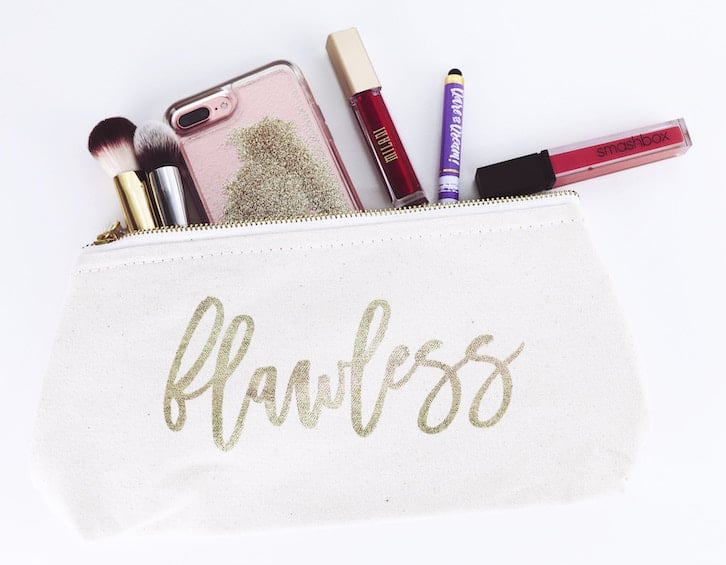
When I was looking for images to use in this article, I came across this seemingly innocuous image above of a makeup bag. Flawless. It’s a word frequently used to describe women’s appearance (or, like, figure skating routines). Macmillan’s Dictionary defines flawless as “Without any mistakes, marks, or bad features.” Damn that’s a weighty expectation to hoist on girls’ shoulders (or faces, as the case may be).
For most of history, makeup has existed to make women more attractive to men. I’d argue that’s still its primary role today, although third-wave feminism holds that it’s empowering, and merely one of many ways in which women can celebrate their femininity in the face of the patriarchy. One of my favorite writers (and a former Sassy Mama contributor), Pooja Makhijani, wrote this beautiful article about rediscovering lipstick during her divorce:
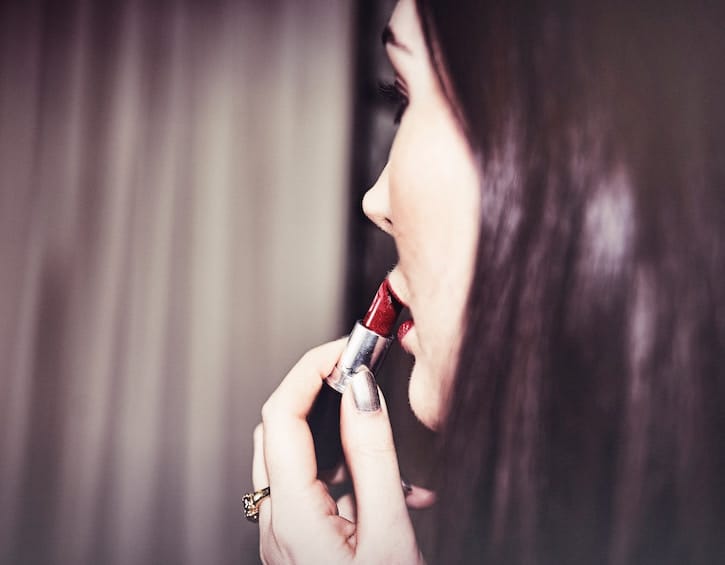
“I wasn’t trying to signal to the male gaze that I was once again available, and I wasn’t trying to hide behind a mask,” she writes. “I just liked the act of applying lipstick every morning. It felt like a 15-second reminder that life still contained joy.”
I’m very clearly in the minority with my feelings about makeup. According to that survey referenced above, 92% of respondents said wearing makeup boosted their confidence. I guess my question is, Why do women need such a confidence boost? And again: What is the male equivalent?
My daughter is already inundated with makeup ads at bus stops and photoshopped models and celebrities on magazine covers. Some day she very well may grow up and adore makeup and blow half her monthly paycheck at Sephora (the forbidden fruit her mother deprived her of as a child!). But until we shift our societal emphasis on the link between appearance and self-worth, I personally don’t feel comfortable encouraging the use of makeup for kids.
Read more:
15 Compliments for Your Kids that Aren’t About Appearance
Respectful Parenting Tips: Modeling Body Positivity for Our Kids from the Start






 View All
View All
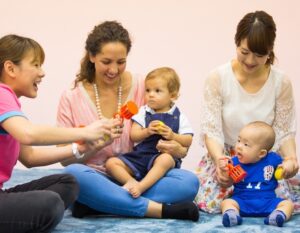

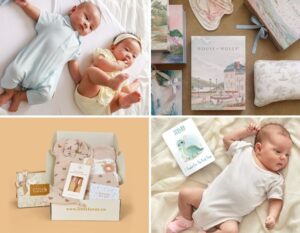


 View All
View All






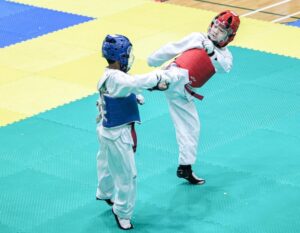



 View All
View All



